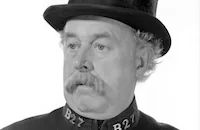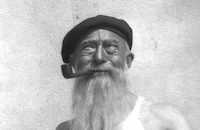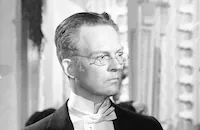Platinum Blonde

Brief Synopsis
Cast & Crew
Frank R. Capra
Loretta Young
Robert Williams
Jean Harlow
Halliwell Hobbes
Reginald Owen
Film Details
Technical Specs

Synopsis
Ace reporter Stew Smith is assigned to cover a breach of promise suit being filed by chorus girl Gloria Golden against Michael Schuyler, member of the wealthy, socially prominent Schuyler family. Stew tricks Mrs. Schuyler into admitting Gloria was paid off, although Michael's letters to her have not yet been recovered. Michael's beautiful sister Ann then tries to charm Stew, but he nevertheless uses their telephone to call in the story to Conroy, his editor. That night Stew discusses the case with his best pal, fellow reporter Gallagher, who is secretly in love with Stew even though he treats her like one of the guys. The next day, Stew goes to see Ann, to whom he gives Michael's letters, which he stole from Gloria while he was interviewing her. Ann apologizes for her rudeness, and they begin seeing each other. A month later, Stew and Ann elope, prompting Conroy to rib Stew about being "Mr. Schuyler." The Schuyler family is furious about the marriage, but Ann assures them she will quickly tame Stew. When Stew arrives, the newlyweds discuss where they will live, and Stew reluctantly agrees to move into the mansion upon Ann's insistence. Later, at a party for the Spanish ambassador, Stew is bored with the stuffed shirts until he sees Gallagher, who is filling in for the newspaper's society editor. Stew and Gallagher's reunion is interrupted by rival reporter Bingy Baker, who offers Stew a job writing a column for Bingy's paper, on the condition that he sign it "by Ann Schuyler's husband." Bingy adds insult to injury by calling Stew a "Cinderella Man," and is rewarded with a punch in the nose. The next day, the incident is on the front page of Bingy's newspaper, much to the dismay of Mrs. Schuyler. As time passes, Stew wearies of the party life, and Ann wearies of him. One night, after waiting impatiently for Stew to get ready for the mayor's reception, Ann goes to get him, but leaves without him when Stew tells her he can no longer tolerate her friends. After a few hours, Stew becomes bored and asks Gallagher for help with the play he is writing. She asks her friend Hank to chaperone, and he brings the whole gang to the Schuyler mansion. While the party reaches uproarious levels downstairs, Stew and Gallagher work on the play, which she tells him to write from his own experience. When Ann returns, she orders Stew to throw everyone out of her house immediately, but Stew can take no more and packs his bags to leave with Gallagher. Later, at Stew's apartment, he and Gallagher are working on the play when Dexter Grayson, the Schuylers' lawyer, arrives to offer him a financial settlement for the divorce. Stew wants no part of the Schuyler fortune and punches Grayson, then writes the incident into his play. Gallagher asks about the play's ending, and Stew tells her that his character will not return to his wife but will instead marry the character Gallagher suggested, because he has been in love with her all along without knowing it.

Director

Frank R. Capra
Cast

Loretta Young
Robert Williams

Jean Harlow

Halliwell Hobbes

Reginald Owen

Walter Catlett
Louise Closser Hale

Edmund Breese

Donald Dillaway
Claude Allister
Crew
Edward Bernds
Frank R. Capra
Harry E. Chandlee
Douglas W. Churchill
Harry Cohn
C. C. Coleman
Stephen Goosson
Dorothy Howell
Gene Milford
Robert Riskin
Edward Shulter
Jo Swerling
Joseph Walker

Videos
Movie Clip





Film Details
Technical Specs

Articles
Platinum Blonde
There is little Gallagher can do to show Smith the error of his ways, but eventually he sees it for himself, after Anne asks him to sacrifice too much of his quick-witted, no-nonsense, urban charm for the sake of high society. The gulf between them further widens when Anne discovers that his best pal Gallagher is a she, not a he, and demands that they end their friendship... leaving Smith to choose between a wealthy, glowing goddess and a working-class gal pal.
Viewers looking for a saucy, innuendo-laden melodrama typical of the "pre-Code" era will find that Platinum Blonde is more of a Capra film than a Harlow film, and sex was never one of the director's strongest suits. Variety characterized the film as "Only innocuously spicy, never sophisticated to the degree family trade snorts at, and the story [goes] about its way smoothly, simply and amusingly, the appeal should be pretty general." The closest Capra came to generating sexual heat in Platinum Blonde is a luminous sequence in which Smith kisses Anne, seen through a wall of glass cascaded by water (photographed by Capra's career-long d.p. Joseph Walker).
The film, which was produced under the title Gallagher, was conceived as a vehicle for Loretta Young, who gets top billing. But somewhere along the way, it became clear to Columbia Pictures that Harlow was the star attraction, not Young. "She wasn't popular with the other actors," Capra remembered, "because they were jealous of her. Her photo was on every movie-magazine cover, and the other actors resented that. But she was an unaffected, sweet, dear lady whom I had nothing but total respect for."
In the 1991 Harlow biography Platinum Girl, Eve Golden aptly notes that Platinum Blonde allowed the actress a chance to expand her range a bit beyond the usual bad-girl roles she had been playing. "Jean acts with Williams, not just at him, as she'd done in The Public Enemy (1931). She tugs playfully at his lapels, peering up into his face with a kittenish assurance that she's too adorable to resist. And she is. Jean is obviously having fun with the role and inviting us to have fun along with her. For the first time on-screen, she is thoroughly likeable."
Nowhere is this more in evidence than a scene that is so natural, it appears to have been improvised: when Anne and Smith playfully argue (to the tune of "The Farmer in the Dale") about whether or not he should wear his new sock garters. Either they are forgetting their lines, or making up their lines as they go, because the scene lacks the timing and control of the rest of the film. In a genre in which every line of dialogue is engineered for maximum cleverness the scene is astoundingly fresh and brings the film alive.
Though some of the actors may have resented the undue attention paid to Harlow, Capra appreciated her dedication to the job. "She certainly was one of the most hard-working and unaffected actresses I have ever worked with. She would even be on the set when she didn't have to be because she was so eager to learn." Apparently, Capra's biggest problem was getting Harlow to speak in a manner suitable to an educated socialite, "I had the darnedest time getting her to pronounce 'library' correctly. She would say 'liberry.'" After a reported fifteen takes, she finally delivered the proper enunciation, and the shoot was allowed to proceed.
Loretta Young came to the film after working for demanding, workmanlike directors, such as Herbert Brenon, who attempted to dictate an actress's every word and gesture. Capra, on the other hand, allowed his cast more room for expression of their own personalities. According to Joe Morella and Edward Z. Epstein's 1986 bio Loretta Young: An Extraordinary Life, Capra sensed Young's lack of confidence on the set, and responded. "Capra took her aside and very quietly asked her, 'What do you think of this character, Loretta?' 'Think?' she quickly blurted out, 'Oh, I never think, Mr. Capra. I never think about the characters I play, I just try to do what the director tells me.' The fear that Capra, too, might turn into a terror obviously lurked in Loretta's mind. Capra very gently explained to her, 'Loretta, acting is what you think. Acting is listening to the other person and then responding, so it is vitally important that you always know what you think.'"
But no matter what Young may have done, Platinum Blonde was fated to be Harlow's picture.
At preview screenings, the focus had already shifted away from the Gallagher character, and the film was retitled The Gilded Cage (a reference to Smith's predicament). It remained so until September 24, 1931, the date of the last preview screening. Once it was screened for the critics and began its commercial run a few days later, the film had been christened Platinum Blonde, to capitalize not only on Harlow's rising popularity, but also the craze for peroxide hair that was sweeping Hollywood.
It is uncertain whether or not the film was re-edited after the preview screenings, to showcase Harlow and downplay Young. Variety did find it peculiar that "Young runs third on footage and is somewhat missed," especially since the actress was top-billed (probably a contractual obligation that could not have been reversed).
Young was not the only actor overshadowed by Harlow. For leading man Robert Williams, best described as a handsome Lee Tracy, Platinum Blonde might have been a career-making performance. "It looks like Williams, who has done exceedingly well in minor roles with RKO-Pathe, has an indisputable chance of stepping ahead," said Roy Chartier in Variety, "If his succeeding parts are made to fit his personality and his demeanor, it will be eggs in his coffee for this newcomer."
Williams never continued his climb. At the time of Platinum Blonde's opening, he took a vacation to Catalina Island. While there, he suffered appendicitis. While awaiting surgery, he developed peritonitis, which doctors could not halt. He died on November 3, 1931, four days after the film's bi-coastal premiere.
Gushing as though they were on the Columbia payroll, the New York Daily Mirror wrote, "Can Frank Capra make pictures! From the thriller Dirigible (1931) to the moving Ladies of Leisure (1930), now the versatile Capra has turned out one of the gayest, sauciest comedies you've ever seen. The banal title, Platinum Blonde, doesn't even hint at the fun packed into this riotous picture."
Most of the critics were more reserved. The New York Times acknowledged the film as nothing more than, "a mildly successful venture on the side of light entertainment," while offering a pithy summation of the Harlow mystique, "a young woman who is spectacular rather than competent as an actress." Young is barely mentioned.
The New York American wrote, "Jean Harlow has very little to do, and Loretta Young even less. To say they are competent to the picture's requirements is only a mild compliment."
When it opened at New York's Strand Theater on October 31, 1931, Platinum Blonde was accompanied by the first installment of Warner/Vitaphone's second series of Ripley's Believe It or Not shorts.
Capra dismissed Platinum Blonde as little more than an "out-and-out comedy" intended to restore Columbia's confidence in him after the disappointing box-office returns of The Miracle Woman (1931). He was assigned to the project after his film Forbidden (1932) was put on hold, due to contract disputes with star Barbara Stanwyck. Capra devotes barely a paragraph to Platinum Blonde in his 1971 autobiography, The Name Above the Title: "We loaded up the picture with gags and a great cast: Loretta Young, Bobby Williams (a new comedy sensation), and -- for sex -- we added Jean Harlow, the reigning Love Goddess. How could I miss? I didn't. And Harlow's breastworks burst their silken confines on magazine covers and pin-up walls." In actuality, Harlow's costumes in Platinum Blonde are chaste in comparison to the transparent blouse she wore in Tod Browning's The Iron Man (1931), or the snug swimsuit in Goldie (1931, a remake of Howard Hawks's 1928 film A Girl in Every Port).
Perhaps Capra discounted Platinum Blonde because he had relatively little to do with its creation. In his thoroughly researched 2000 bio of Capra The Catastrophe of Success, Joseph McBride reveals that the screenplay was almost finished before Capra came to the project. In fact, it had been developed as a property for another director: Eddie Buzzell, who later helmed the Marx Brothers' At the Circus (1939) and Go West (1940). "Capra was the second director on the project and came along after the writing was well under way, if not completely finished. His working script contains only a few minor pencil changes; there is nothing else in his files to indicate that he had anything more than that to do with the writing."
Less important than how much Capra shaped Platinum Blonde is how much it shaped him, for one of the five credited writers was Robert Riskin, who had also written the play upon which Capra's 1931 film The Miracle Woman was based, and who would later pen the masterpieces upon which Capra's sterling reputation is founded: It Happened One Night (1934), Mr. Deeds Goes to Town (1936), and Meet John Doe (1941), among others. This alone makes Platinum Blonde a film of enormous historical significance.
Director: Frank Capra
Producer: Harry Cohn
Screenplay: Dorothy Howell, Jo Swerling, Robert Riskin
Story by Harry E. Chandlee and Douglas W. Churchill
Cinematography: Joseph Walker
Production Design: Stephen Goosson
Cast: Jean Harlow (Anne Schuyler), Robert Williams (Stewart Smith), Loretta Young (Gallagher), Louise Closser Hale (Mrs. Schuyler), Edmund Breese (Conroy), Halliwell Hobbes (Smythe), Reginald Owen (Dexter Grayson), Walter Catlett (Bingy Baker).
BW-89m.
by Bret Wood

Platinum Blonde
Quotes
The last time I asked her for those letters, she made very uncouth noises with her mouth.- Dexter Grayson
Yeah, I know those bluenoses. Their ancestors refused to come over on the Mayflower because they didn't want to rub elbows with the tourists... so they swam over!- Stew Smith
Where were you yesterday?- Dexter Grayson
Oh, Stew and I went for a long ride. Dexter, is there any finishing school we could sent him to?- Anne Schuyler
Yes -- Sing Sing!- Dexter Grayson
Say, I interviewed a swell guy the other day: Einstein. Yeh, swell guy. Little eccentric, but a swell -- doesn't wear, doesn't wear any garters. Neither do I, as a matter of fact.- Stew Smith
Anne Schuyler's in the blue book; you're not even in the phone book. Think that one over... sucker!- Conroy, The Editor
Trivia
Notes
The film's working titles were Gallagher and The Gilded Cage. According to contemporary news items, it was put into production on short notice, ahead of Forbidden, directed by Frank Capra and starring Barbara Stanwyck, when Stanwyck began a contract dispute with Columbia and production on Forbidden was delayed. Although Film Daily reported that Halliwell Hobbes joined the cast in place of Donald Dillaway, both Hobbes and Dillaway are in the film. Platinum Blonde was the first film on which Capra and Robert Riskin worked together. Robert Williams, who received excellent reviews for his portrayal of "Stew Smith," died on November 3, 1931 following operations for appendicitis and peritonitis. This was his last film. According to modern sources, six other writers besides the five given screen credit worked on the script, but their names have not been determined. Modern sources list the following additional cast members: Bill Elliot (Dinner guest), Harry Semels (Waiter), Olaf Hytten (Radcliffe), Tom London, Hal Price, Eddy Chandler, and Charles Jordan (Reporters), Dick Cramer (Speakeasy proprietor), Wilson Benge (Butler).














